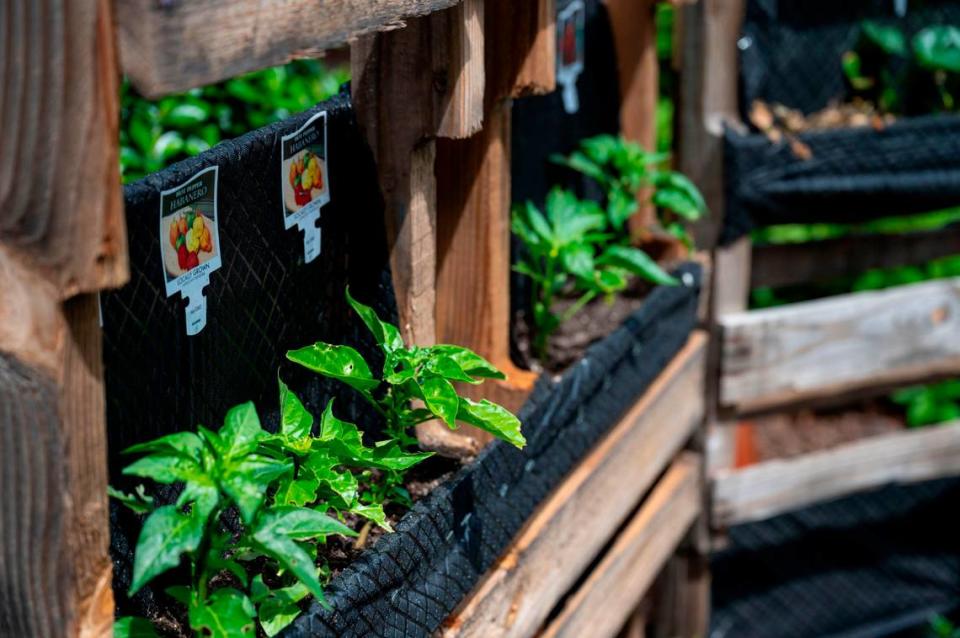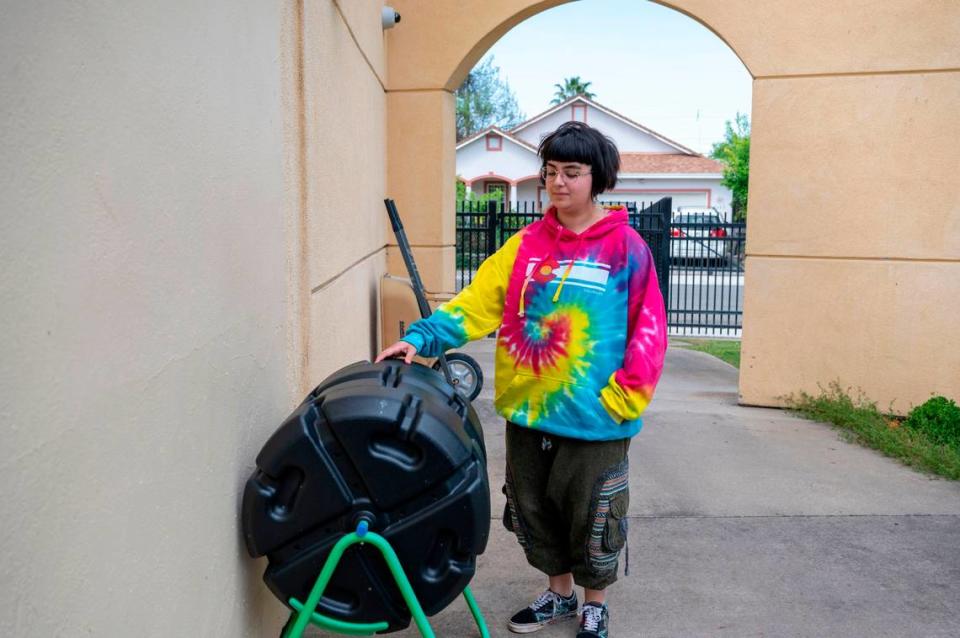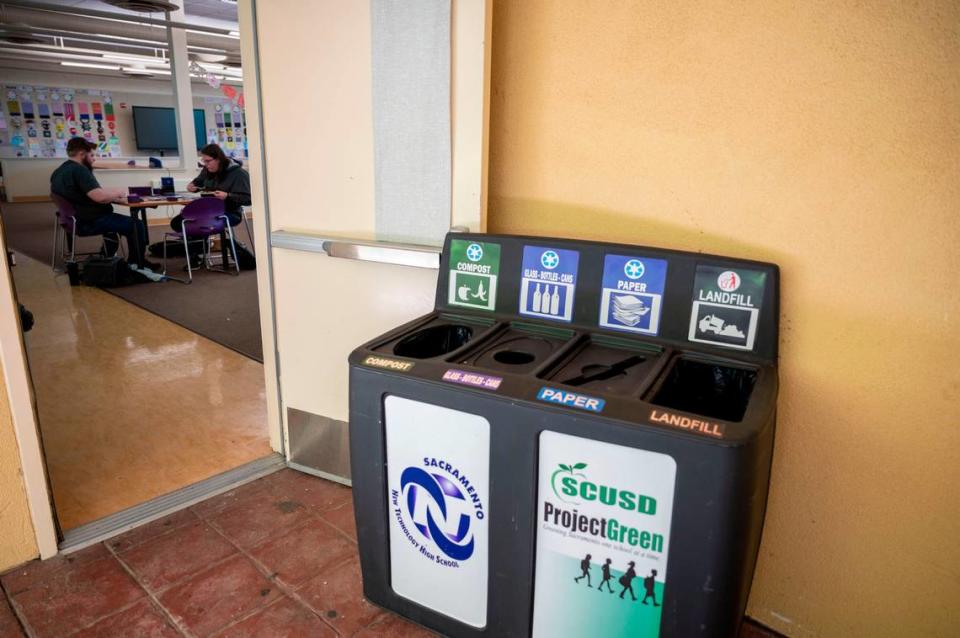The Bee gave Sacramento students money for a compost program. Now they’re planting a garden
Not too long ago, many of the Gardeners of the Galaxy, a group of 11th graders at south Sacramento’s New Technology High School, didn’t believe it was worth trying to fight climate change.
The issue seemed inevitable — a somber backdrop to their young lives.
“I just thought that not enough people were going to make this massive change,” said Mekhilyn Durr, a 16 year old in the group.
But last winter, Durr and other students in his physics class were approached to pitch a local solution to climate change. The teenagers decided to focus on food waste, which generates greenhouse gasses and ultimately contributes to global warming.
Now, these students are weeks away from building a school compost garden that will recycle food scraps and grow seasonal fruits and vegetables. In the meantime, they’ve added compost bins around campus, spent months educating fellow students about the negative effects of food waste and come up with their group name — a play on the Marvel Comics superhero team.
Their ultimate goal is to inspire youth across their Sacramento City Unified School District to become environmental problem-solvers. Only then will younger generations have a chance against this existential threat, said 17-year-old Carlos Leon.
“It’s important that we become change makers and encourage others to become change makers or else climate change will worsen, and it will affect everybody,” Leon said.
They’re still worried, added Durr. But they’re not giving up.
“Joining this group has made me realize that I can be part of the solution,” Durr said.

‘They took it and ran’
The Gardeners of the Galaxy came together in part thanks to The Sacramento Bee and the Solutions Journalism Network’s Beacon Initiative to address climate change.
Last November, Joe Flores, a leader in the school’s district and Bee Equity Lab Change Maker, reached out to New Technology High School Principal Jessica Martin about the initiative which called on readers to submit climate pitches.
Martin, who was teaching the 11th grade physics class, raised the idea with her students who were in the midst of selecting a class project.
The high school, and its 150 students, is project-based, Martin said. Students are given a driving question or problem and must do their own research to solve it.
The students didn’t waste much time on the topic of climate change.
“All I did was facilitate and give them space,” Martin said. “They took it and ran.”
The students began researching different ideas and soon came up with a slideshow and a three-minute video on the effects of food waste and how they can do their part locally. Their submission was one of three entries that won a $5,000 grant from the initiative.
“It just reiterates (that) when you give a task to kids and you set the bar high, they’ll meet that bar,” Martin said.

Roughly $500 of the grant money will go toward buying compost tumblers to help fertilize a community garden at Argonaut Park, land owned by the school district and adjacent to the high school. The tumblers will be spun to turn decomposing plants and food waste from the students into fertilizer for the garden.
Composting is important because food waste is estimated to be between 30% to 40% of the food supply in the country, according to the U.S. Department of Agriculture. The global carbon footprint of food waste worldwide is about 3.3 billion tons of carbon dioxide or 7% of all global emissions.
New Technology High School’s garden, which is expected to be built by the end of May, will play its part in helping minimize those emissions. Students, parents, faculty and the school custodian will volunteer to care for the garden in the summer, Martin said.
“It starts with a small scale,” said 17-year-old Miranda Navarro-Miranda. “It starts with our school, and then it builds habits to be more eco-friendly because that’s what is going to help us.”
‘Future generation of students’
While the Gardeners of the Galaxy wait to get their hands dirty, they’ve focused on creating a budget, a three-year sustainability plan and, most importantly, educating their classmates.
The group visited each classroom on campus to present their project, discuss climate change and encourage students to begin disposing of their food waste in the new labeled bins placed around campus. They expect their climate initiatives to extend into their senior year, and hopefully lead to a change in culture within the school.
But, there was one early challenge. Some students did not comply with proper food waste disposal. A few of their classmates merely forgot, while others chose to not obey due to apathy, said Navarro-Miranda and Leon.

The group of 13 students has since taken on the role of campus role models, reminding and encouraging students which bins are appropriate for landfill trash, food waste and recyclables.
“A lot of kids have that defeatist mentality, so it did take a while for kids to really listen to the core idea,” Navarro-Miranda said.
Now, the Gardeners of the Galaxy have moved on to larger goals.
The group recently reached out to the school district’s sustainability manager to ask about visiting elementary schools and teaching younger students about food waste. They hope that every school in the region, and possibly California, can have its own compost garden.
“Our goal is to create a system and leave something behind that the future generation of students can follow and continue,” Leon said.

